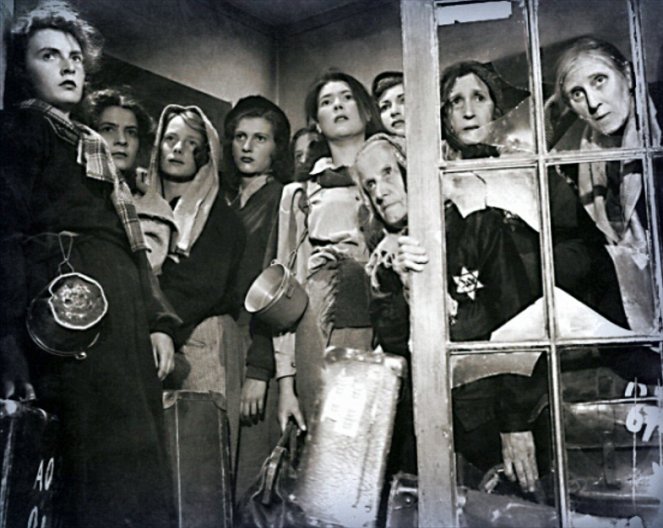Réalisation:
Alfréd RadokPhotographie:
Josef StřechaMusique:
Jiří SternwaldActeurs·trices:
Blanka Waleská, Otomar Krejča st., Viktor Očásek, Zdeňka Baldová, Eduard Kohout, J. O. Martin, Josef Chvalina, Anna Vaňková, Jiří Plachý st. (plus)Résumés(1)
Prague, pendant la seconde guerre mondiale. Progressivement, l'étau nazi se resserre autour de la communauté juive. Pour tenter de sauver de la déportation la jeune doctoresse Hanna Kaufmannova, dont il est très amoureux, le docteur Antonin Bures, non juif, l'épouse. Mais la persécution s'abat sur la famille dont les membres sont envoyés à Terezin, misérable ghetto où ils attendant d'être transférés vers les camps de la mort. Hanna supportera-t-elle d'être séparée des siens ? Un chef d'œuvre qui inspira Alain Resnais et qui restitue, par la maîtrise des éclairages contrastés, le décor expressionniste, les angles étranges, les effets sonores et des images d'archives inquiétantes, le cauchemar quotidien des victimes de l'idéologie fasciste. (Doriane Films)
(plus)Critiques (3)
One of the greatest crimes the Bolsheviks perpetrated was to bury this direct formal successor to Eisenstein and Welles in the bowels of a vault with such thoroughness that even today the film doesn't get the attention it deserves. Especially when compared to the nationalizing opuses of the time such as those where Buchvaldek and Švorcová pranced around beyond the pale.
()
Alfréd Radok's Distant Journey is a unique film. I only ever watch it on the big screen and it is regularly accompanied by various commentaries and it is fully respected. However, I personally don't love the combinatorics of serial documentary footage and Triumph of the Will (1935), which is much more specific in its images and it is not very appropriate to handle Leni Riefenstahl's work, which has its own story. I'm also not too keen on the pairing of scenes told in film and theater language in regular contrasts. I am also regularly amazed at the union of Blanka Waleská and Otomar Krejči. I really would have appreciated the suppression of the cheaply-caricatured characters of Kreuzmann, Svoboda, the gossipy Balek-Brodská, Vojtová, and Májová, as well the then-teenagers Kopecký and Effa. On the other hand, I fully respect certain performances, particularly of Zdeňka Baldová, Eduard Kohout, and Jiří Plachý. I also appreciate the realism of the Terezín scenes, but the artificial elements, such as the hanging piano and the spiral staircase, are a significant shadow on the film. I found most impressive the preparation for the visit by the Red Cross to the sounds of the rehearsal of the Brundibár children's opera. Was it really necessary to waste so much on formal stylization, to mix narrative film with documentary, film with theater, and to punctuate raw reality with props? The Holocaust is the most tragic event in human history, so a merely raw interpretation without ribbons on the sides would have been much better.
()
In its time, it was definitely a necessary film that dealt with the recent painful past. However, I won't give it four stars because there are enough enthusiastic admirers who want to praise the famous name of Alfréd Radok and the equally famous film, so I don't have to enhance the film's reputation. From my perspective, there are basically two things that detract from my impression of it. The performances are uneven and some of the actors seem to rely on what was good enough for interwar melodramas and undemanding comedies, but it is not sufficient for a psychologically exposed oppressive drama. That sort of thing simply requires top-notch character acting. And secondly, Alfréd Radok's aesthetics are very theatrical, unsuitable for the film medium. Overall impression: 65%.
()
Photos (41)
Photo © Československý státní film


Annonces